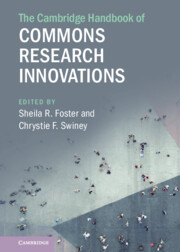Book contents
- The Cambridge Handbook of Commons Research Innovations
- The Cambridge Handbook of Commons Research Innovations
- Copyright page
- Contents
- Figures
- Tables
- Contributors
- Introduction
- Part I Revisiting the Origins and Evolution of Commons Thought
- Part II Averting New Tragedies
- Part III New Forms of Contested Commons
- Part IV Urban Landscape and Infrastructure as a Commons
- 10 Seeing New York City’s Urban Canopy as a Commons
- 11 The City as a Commons Reloaded
- 12 Urban Commons Architecture
- Part V Reassessing Old and New Institutions for Collective Action
- Part VI Managing and Restoring the Commons
- Part VII Law, Legal Theory, and the Commons
- Part VIII Technology, the Internet, and the Future of Commons Governance
- Index
12 - Urban Commons Architecture
Collaboration Spaces Innovating Learning within Cities
from Part IV - Urban Landscape and Infrastructure as a Commons
Published online by Cambridge University Press: 29 October 2021
- The Cambridge Handbook of Commons Research Innovations
- The Cambridge Handbook of Commons Research Innovations
- Copyright page
- Contents
- Figures
- Tables
- Contributors
- Introduction
- Part I Revisiting the Origins and Evolution of Commons Thought
- Part II Averting New Tragedies
- Part III New Forms of Contested Commons
- Part IV Urban Landscape and Infrastructure as a Commons
- 10 Seeing New York City’s Urban Canopy as a Commons
- 11 The City as a Commons Reloaded
- 12 Urban Commons Architecture
- Part V Reassessing Old and New Institutions for Collective Action
- Part VI Managing and Restoring the Commons
- Part VII Law, Legal Theory, and the Commons
- Part VIII Technology, the Internet, and the Future of Commons Governance
- Index
Summary
Sofia Croso Mazzuco explores the advancement of the urban commons in relationship to the fields of architecture and urban design, while articulating the need to challenge the mainstream practice having the architect/urban designer as the central decision-maker of how a place will shape. For that, Mazzuco defines Urban Commons Architecture, imbued with a practical learning approach, and provides a systemic analysis of two related projects that she co-created. These projects are set in Brazil, whilst the resulting insights are applicable to different global contexts. The first project is a multi-generation school co-designed with, and for, a rural-urban community in Sergipe (northeast of Brazil) who will, also hands-on, co-build part of the school. The second project is a network of public spaces in the city of Campinas (state of São Paulo), co-designed and co-built through an innovative pedagogical process embraced by local learning institutions and the expanded community. Mazzuco outlines the benefits of architecture and urban design as a commons, reflected in both the design process and the resulting spaces supporting communities to flourish innovatively and inclusively, and discusses the opportunities and challenges of this approach in relationship to the predominant perspective of collaboration in different cultural contexts, specifically in Brazil. Altogether, this chapter explores the continuous interaction between the practice and the theory of the urban commons, raising important reflections for architects and urban designers, who willingly or not, are continuously shaping social interactions and the possibility of the commons.
Keywords
Information
- Type
- Chapter
- Information
- The Cambridge Handbook of Commons Research Innovations , pp. 138 - 152Publisher: Cambridge University PressPrint publication year: 2021
Accessibility standard: Unknown
Why this information is here
This section outlines the accessibility features of this content - including support for screen readers, full keyboard navigation and high-contrast display options. This may not be relevant for you.Accessibility Information
- 1
- Cited by
